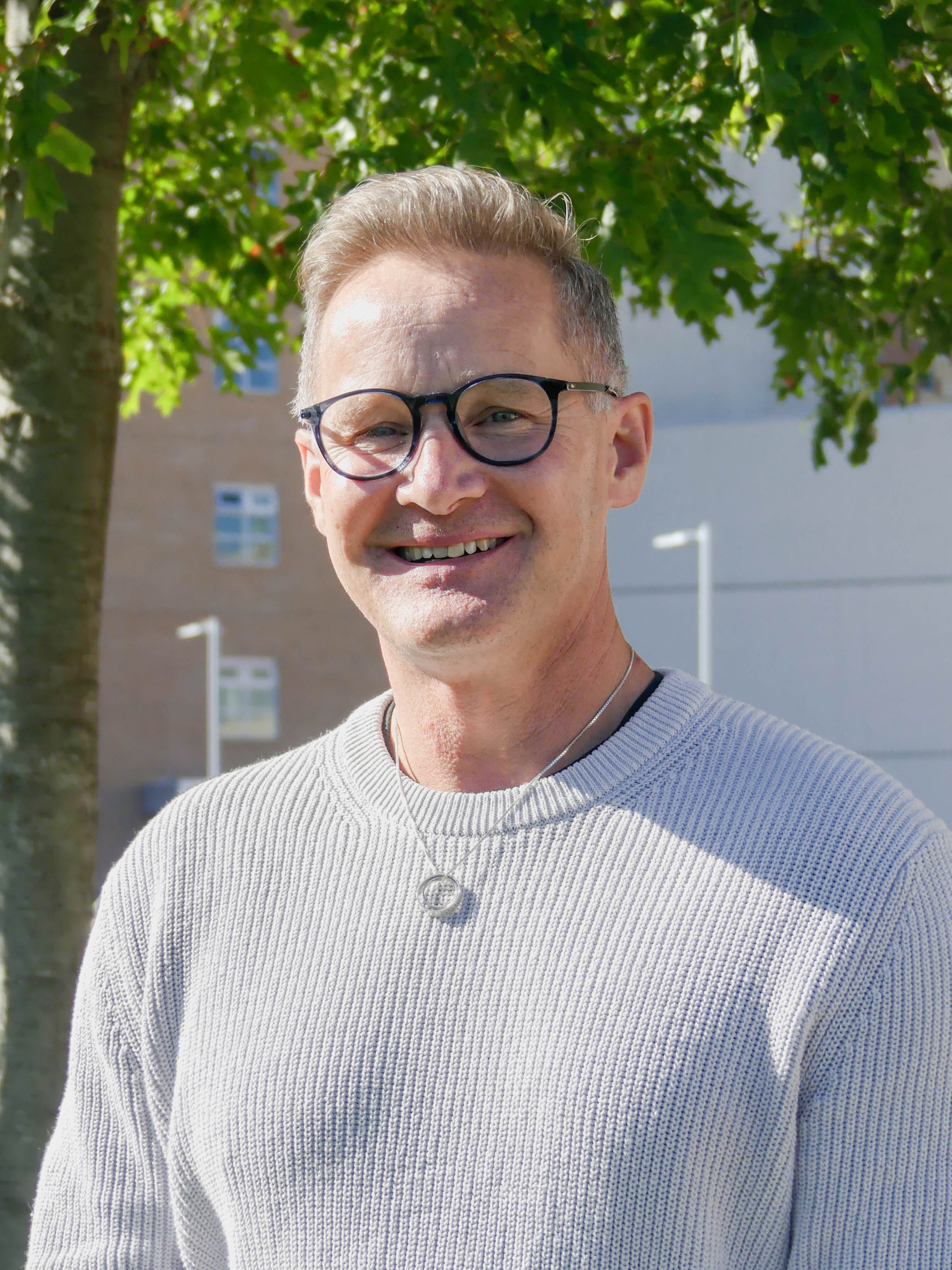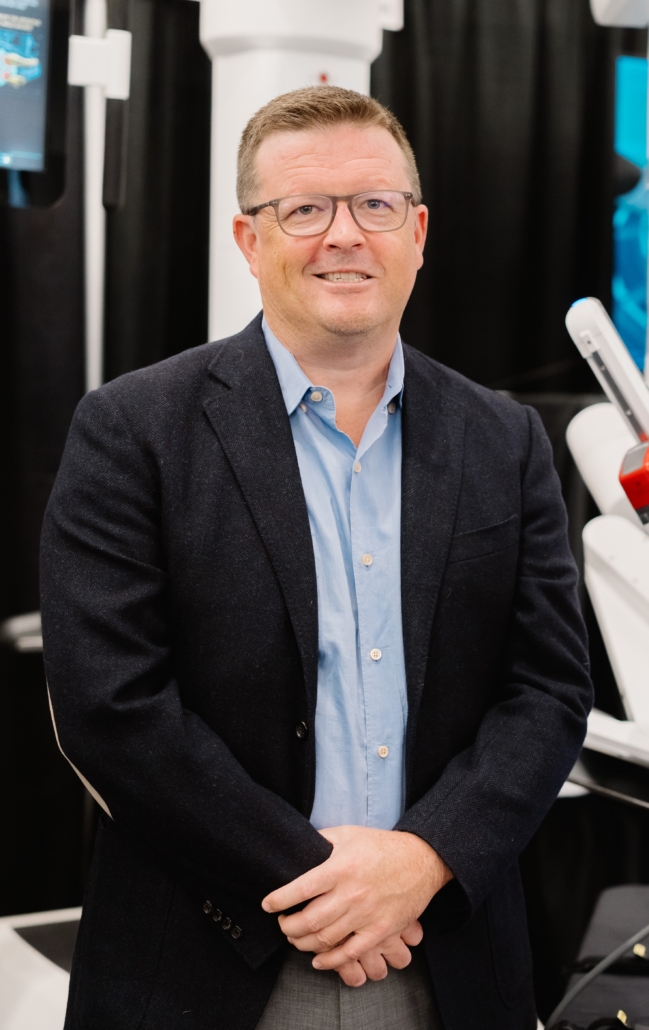Steve’s Story
Getting Back To Being “The Hulk”

Over my twenty-five years of teaching, my elementary school students have nicknamed me “The Hulk.” Perhaps it’s my love for CrossFit and my tall stature; perhaps it’s my desire to always go all in, along with my larger-than-life passion for education, physical health, and my family. But when I was diagnosed with cancer last year, I suddenly didn’t feel like I was invincible, or too strong for anything at all… I didn’t feel like “The Hulk” anymore.
Prostate cancer runs in my family. My dad was diagnosed six years ago, at a much later stage than I eventually would be. Before my very own eyes, I saw the challenging journey he would take. He received excellent care, truly—but the cancer metastasized to his bones. Due to the advanced cancer and his age, he was never eligible for surgery. After undergoing numerous rounds of radiation treatments, his battle with prostate cancer will never be over, as he continues his fight against cancer with hormone-blocking therapy. Prostate cancer feeds on testosterone—the whole plan for him is to keep his testosterone at zero. It’s hard on him, and hard on us to see him in that light—a dimmer light, for sure.
My uncle was diagnosed with the same cancer shortly after. They had the same symptoms. It was hard on my family to comprehend how this could happen to us again.
My dad has participated in a few studies over the years, and through that, we found out he was a carrier of the BRCA2 gene mutation. When you have the gene mutation, and it is genetically transferred, it can increase your chances of having prostate cancer by up to 30% and makes the cancer more aggressive.
As his child, I was able to get tested as well. I, too, had the gene mutation.
At this point, Dr. Iain McAuley had been my urologist for a decade already, often treating me for kidney stones. When he learned I had the BRCA2 gene mutation, he made a plan to monitor my PSA (prostate-specific antigen) levels every year through a baseline blood test. The PSA test can be a powerful predictor of future prostate cancer in men.
In 2023, at the age of 55, my PSA levels spiked beyond normal levels for someone my age. I went in for an MRI scan, but the scan didn’t reveal anything abnormal. However, the fact that I had the gene and an elevated PSA still warranted a biopsy. He said, “It’s an uncomfortable procedure, but I would rather do the biopsy now and find nothing, instead of looking back years from now at a possibly much more advanced cancer and wish we would have done a biopsy”. For that sage advice, I will be forever grateful.
I had my biopsy weeks later, this past January, at Royal Jubilee Hospital. Of the dozen samples, the majority came back with a high Gleason score—a powerful predictor of cancer. I had prostate cancer.
Part of me was shocked. How can this be possible? I’m one of the fittest people I know at my age. Part of me wasn’t surprised, as it had been a recurring issue in my family. Part of me was terrified. It could be a long and hard road ahead. What about my wife, Lisa? What about my students? What about my parents? Cancer is always harder on our loved ones.
Telling my mom was perhaps the hardest. She had seen what radiation and hormone-blocking therapy, albeit good, had done to my dad and my uncle. I was her son, her child — seeing my mom’s reaction to the news of my cancer diagnosis was excruciating.
Thankfully, Dr. McAuley was reassuring and direct. “This is something we have to do something about,” he said.
I cannot thank Dr. McAuley enough for his thoroughness and proactiveness in quickly arriving at my diagnosis—for having the foresight to proceed with a biopsy even when the MRI showed no cancer. It was thanks entirely to Dr. McAuley that we discovered my cancer at an early stage and developed a plan to attack it so quickly. He explained that I had two options: radiation, like my dad and uncle, or surgery.
Lisa and I went down a rabbit hole, searching and seeking out our best option. My two hopes were: 1) to get rid of the cancer, and 2) to keep my testosterone intact. As much as I care about my physical health, I also care about my mental health. CrossFit is what keeps my mind healthy—and I knew I wouldn’t be able to do it without testosterone.
It was a no-brainer for us to go the surgical route: 1) I simply wanted the cancer out and gone. 2) By electing to have surgery (and assuming it would be successful), I would not have to begin any type of hormone-blocking therapy. 3) If a patient chooses the radiation route, once the prostate has been radiated, surgery rarely an option if the cancer returns. 4) Radiation at a young age can expose other areas to risk. Although the goal of radiation is to confine it to the prostate, other areas in the field may still be exposed; in 10+ years, a patient may develop other cancers due to radiation exposure.
In February, we met with Dr. McAuley again to give my decision. He was in full support, but announced that he was retiring. He referred me to Dr. Jeff McCracken with great certitude and confidence.
I trust Dr. McAuley wholeheartedly—and I would come to trust Dr. McCracken the same way.
I went through a number of diagnostic tests following that appointment: blood tests, chest X-ray, CT scan with radioactive dye, another MRI scan… I pause here because I know so much of the reason I was able to get the very best diagnostic tests was due to the generosity of our community. Victoria Hospitals Foundation donors have truly set up a strong diagnostic base by funding a new Chemistry Line and imaging equipment over the last few years. What an immeasurable gift.
I met with Dr. McCracken on Valentine’s Day of this year. His bedside manner was outstanding. In my own research, I found that Dr. McCracken had outstanding stats in BC for the radical prostatectomy surgery (removal of the prostate) I would need.
I also discovered that robotic surgery was an excellent option. From what I read everywhere, the benefits of robotic surgery included: 1) a shorter stay in hospital of 1-2 days, compared to 3-5 days with traditional surgery, 2) a quicker overall initial recovery, with return to work in 2-3 weeks, compared to 8-9 weeks, and 3) less possible post-op surgical complications, including blood clots.
What I didn’t know then was that robotic surgery wasn’t an option in Victoria… not yet, anyway. My heart sank a little at that moment.
Though I considered going to Vancouver for robotic surgery, it didn’t seem practical. First, I would need to be referred by Dr. McCracken and go on a new waitlist. I would also need to travel to Vancouver for pre-op, the surgery itself, and post-op care. If there were any complications post-surgery, which you will soon read about, the idea of traveling back and forth, and being away from my support system, didn’t seem appealing.
I decided to stay in Victoria, under the care of Dr. McCracken. He is a rockstar in his field, and I couldn’t have asked for a better surgeon. Not only, in my opinion, is he a top surgical choice for radical prostatectomy, but his pre-surgical discussions made me confident he was the right choice.
Dr. McCracken helped set up some goals for the surgery: 1) get rid of the cancer, 2) get the post-surgery incontinence under control, and 3) restore erectile function. I added another: 4) to get back to the gym as soon as possible.
On March 5th of this year, I had what I can only describe as life-saving surgery. It almost felt as if anyone I met in the hospital that day, and on the days following, played a special role in my life. They were all so caring, so considerate. I just felt at ease and knew exactly what to expect.
I stayed for recovery at Royal Jubilee Hospital for three days. I yearned to be home so badly—but when I finally was, it was still a long road ahead. I went home with a painful scar, and a catheter.
I couldn’t lie flat for two weeks due to the incision. After nine days, it was actually Dr. McAuley who removed my catheter, as Dr. McCracken was out of town. It was fine at first, but then I started urinating a little blood. And then, a lot of blood.
A clot had developed and was blocking my bladder—possibly because I had been walking too much. With prostate surgery like I had done, the risk of a post-op blood clot is 16%—with robotic surgery, that goes down to 1%.
I went to the Emergency Department at Royal Jubilee Hospital and was seen in no time. I’ve never been happier than when they put a catheter back in to relieve the pressure I was feeling.
Dr. McCracken called me from his vacation in Mexico to check in. His bedside manner is just extraordinary. He shared the results of the pathology report: the tumor was 1.3 cm. Talk about aggressive: that tumor grew within three months from simple cancer cells. He then said, “The pathology came back with a score of 3+4=7, and it looks like it was confined to the prostate.” That was the good news we were looking for, because that means, so far, it looks like they got it all.
As soon as I thanked Dr. McCracken and hung up, my wife Lisa broke down. You see, Lisa is my rock. She was stoic and supportive throughout my entire journey. She stood by my side and held my hand when needed, all with determined optimism. That phone call revealed just how hard the journey had been on her, too. For Lisa and me, Dr. McCracken and Dr. McAuley not only saved me—they saved us.
Looking back at my surgery goals, all were successfully achieved. Six months later, I am about 90% of where I was in terms of my CrossFit activities.
I didn’t tell my students about my cancer while I was going through it. I just told them The Hulk was getting abdominal surgery. I am proud to share my story with them—I am living proof that some cancers can be cured. When I first returned to school, they ran towards me in unison. It was a special moment for sure.
I also proudly share with anyone who will listen that we have the best doctors, the best surgeons, and the best healthcare staff here in Victoria.
Imagine what a surgeon like Dr. McCracken, and others in the same field, could accomplish for their patients with the latest innovations like robotics. I could have gone home the same day of my surgery, with much less pain. The first stage of my recovery would have been reduced from 9 weeks to 2-3 weeks. Perhaps I wouldn’t have had the clot…
All to say, these top surgeons in Victoria need the latest robotic innovations to take their patient care to the next level. I would give Dr. McAuley and Dr. McCracken the stars if I could. Perhaps, getting them robotics is just as close.
With deep gratitude,
Steve Marta
Loving son and husband, Grade 2/3 teacher, and CrossFit athlete
Affectionately known as “The Hulk”




